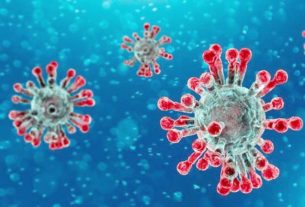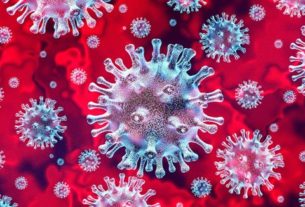From Our Bureau
20TH JULY 2020
The Corona Virus (COVID-19) pandemic situation remained grim globally, with the confirmed cases across the world soaring to 1,43,48,858 and the death toll rising to 6,03,691 in the 216 affected countries and territories, according to the latest update from the World Health Organization (WHO).
Globally, American region continued to be the worst-hit with 75,84,675 confirmed cases and 3,09,309 deaths. Europe came next with 30,79,218 confirmed cases and 2,07,535 deaths. South-East Asia region’s tally stood at 14,36,141 confirmed cases and 34,388 deaths.
Eastern Mediterranean region reported 13,87,295 confirmed cases and 34,686 deaths. African region registered 5,97,223 confirmed cases and 9,691 deaths. Western Pacific region recorded 2,63,565 confirmed cases and 8,069 deaths. WHO Risk Assessment at global level remained very high.
As the pandemic deepens economic and social stress, the risk of gender-based violence intensifies, with serious consequences for mental health of those at risk. WHO Regional Director for the Americas, Dr Carissa F. Etienne emphasized the need for integrating psychosocial support and mental health services as part of the COVID19 response.
More than one million patients have recovered from COVID-19 in the Eastern Mediterranean Region since 29th January 2020. WHO Regional Director for the Eastern Mediterranean, Dr Ahmed Al-Mandhari acknowledged this positive milestone, and urged countries to continue to engage communities, promote the recovery of COVID-19 patients, and provide strong government leadership.
During health emergencies, one of WHO’s most vital roles is to gather data and research from around the world, evaluate it, and advise countries on how to respond by working closely with experts from around the world. More than 100 documents have been published by WHO on COVID-19 since January 2020.
At the media briefing today, WHO Director-General Dr Tedros Adhanom Ghebreyesus observed “although people of all walks of life are affected by COVID-19, the world’s poorest and most vulnerable people are especially at risk. That is true of indigenous peoples all over the world, in urban or remote areas. There are up to 500 million indigenous peoples worldwide, in over 90 countries.”
“Indigenous peoples have unique cultures and languages, and deep relationships with the environment. Like other vulnerable groups, indigenous peoples face many challenges. This includes a lack of political representation, economic marginalization and lack of access to health, education and social services. Indigenous peoples often have a high burden of poverty, unemployment, malnutrition and both communicable and non-communicable diseases, making them more vulnerable to COVID-19 and its severe outcomes,” he pointed out.
“Although COVID-19 is a risk for all indigenous peoples globally, WHO is deeply concerned about the impact of the virus on indigenous peoples in the Americas, which remains the current epicenter of the pandemic. As of the 6th of July, more than 70,000 cases have been reported among indigenous peoples in the Americas, and more than 2,000 deaths. Most recently, at least 6 cases have been reported among the Nahua people, who live in the Peruvian Amazon.
“WHO’s Regional Office for the Americas recently published recommendations for preventing and responding to COVID-19 among indigenous peoples. WHO is also working with the Coordinator of Indigenous Organizations of the Amazon River Basin to step up the fight against COVID-19.
“One of the key tools for suppressing transmission in indigenous communities – and all communities – is contact tracing. No country can get control of its epidemic if it doesn’t know where the virus is. As we have said many times, so-called lockdown measures can help to reduce transmission, but they cannot completely stop it.
“Contact tracing is essential for finding and isolating cases and identifying and quarantining their contacts. Mobile applications can support contact tracing, but nothing replaces boots on the ground – trained workers going door-to-door to find cases and contacts, and break the chains of transmission.
“Contact tracing is essential for every country, in every situation. It can prevent individual cases from becoming clusters, and clusters turning into community transmission. Even countries with community transmission can make progress by breaking down their epidemics into manageable parts. This is all the more critical as countries are opening up. Reacting rapidly to new cases and clusters will allow countries to continue on the road to economic recovery, while keeping the virus at bay.
“Of course, contact tracing is not the only tool – it must be part of a comprehensive package. But it is one of the most important. Contact tracing has long been the bedrock of outbreak response, from smallpox to polio, to Ebola and COVID-19. One of the lessons from the recent Ebola outbreak in the eastern Democratic Republic of the Congo, which was declared over last month, is that contact tracing can be done even in the most difficult circumstances, with security problems.
“When Ebola was discovered in the city of Butembo last year, experts wondered whether it would be possible to bring the outbreak under control. But against all odds, the outbreak was stopped in large part because the government, WHO and partners invested heavily in contact tracing, isolating suspected cases and treating those that became sick. Over and over again, trained contact tracers working closely with local leaders and communities tracked the virus, sometimes over hundreds of miles in very difficult terrain.
“Ebola and COVID-19 are different viruses but the principle is the same: No matter how bad the situation, there is always hope. With strong leadership, community engagement, and a comprehensive strategy to suppress transmission and save lives, COVID-19 can be stopped. We do not have to wait for a vaccine. We have to save lives now. Make no mistake, we must continue to accelerate vaccine research, while doing more with the tools we have at hand,” the WHO Director-General added. (eom)


